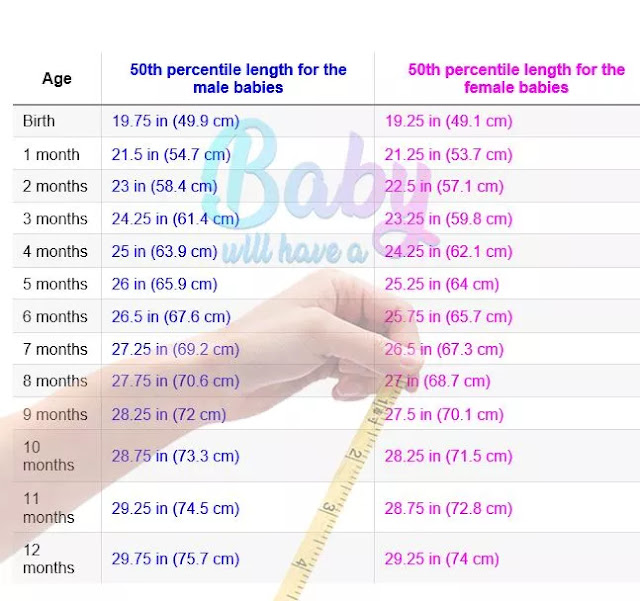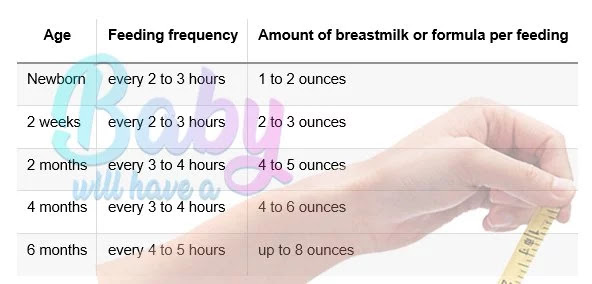The Right Way To Measure Newborn Length
Newborn length is measured from the baby’s head to heels while laying down,
same as the baby’s height but height is measured while standing the baby up.
The average newborn length at birth for a full-term baby is 19 to 20 inches (50 cm).
But the range for most newborns is between 18 and 22 inches (45.7 to 60 cm).
Things to know When Measuring The Newborn Length
Knowing the average newborn length can help you determine whether your newborn is in a larger or smaller size percentile.
Babies come in all sizes and shapes, and diapers go by weight.
Is My Newborn length Normal For His Age?
The following chart lists the average newborn lengths (50th percentile) for the male and the female babies from birth to 12 months.
This compiled data is from (WHO) the World Health Organization
If your newborn is in the 50th (middle) percentile, this means 50 percent of newborn babies measure shorter than your newborn baby ,
and 50 percent of newborn babies measure longer.

Common Reasons For Newborn Babies That Are Bigger In Size Than Average Newborn Babies:
- A baby is born beyond the full-term.
- Parents are larger than average size adults.
- The mother has gestational diabetes which is a type of diabetes that develops during pregnancy.
- Newborn boys tend to be larger than newborn girls.
On The Other Hand, Common Reasons For Newborn Babies That Are Smaller In Size Than Average Newborn Babies:
- The mother took drugs, drank alcohol, or smoked during the pregnancy.
- Nutrition was poor during pregnancy.
- Girls tend to be smaller than boys.
- Parents are smaller than average size adults.
- Health conditions such as asthma or high blood pressure were present during pregnancy.
Also, you can read 8 Things to Know About Low Birth Weight Babies
Newborn Growth In The First Year
On average, newborn babies grow 0.5 to 1 inch (1.5 to 2.5 cm) each month from newborn baby’s birth to 6 months.
From 6 to 12 months, newborn babies grow an average of 3/8 inch (1 cm) per month.
Newborn babies may grow more (growth spurts) or less during sometimes. For example, toddlers tend to go through growth spurts at:
- 10 to 14 days
- 5 to 6 weeks
- 3 months
- 4 months
Why I Should Keep Track Of My Newborn length?
Your pediatrician will measure your newborn for length at each appointment. This is an important measurement,
but your doctor will likely be most concerned that your newborn is gaining weight each month.
Toddlers should double their birth weight by age 5 months, and triple their birth weight by one year.
Remember, babies, go through growth spurts. Your newborn’s month-to-month progress on the growth chart isn’t as important as the trend of their curve overall.
If there’s a problem and your baby fails to grow or their growth has slowed during their first year, your doctor may refer you to a specialist.
An endocrinologist may take blood tests, X-rays, or body or brain scans to determine why your newborn has stopped growing.
In rare cases, your doctor may want to test your newborn for:
- Growth hormone deficiency
- Turner syndrome
- Hypothyroidism
Your doctor can recommend medications or hormone injections, if necessary.
How Much Should I Feed My newborn?
Every newborn is different, but here are some guidelines for how much and how often your newborn should eat:
Solid foods should be started between 6 to 8 months, though your doctor may recommend introducing solids earlier if your newborn shows signs they’re ready.
Once you introduce solids, continue to provide breastmilk or formula until your newborn is at least 1 year of age.
Feeding frequency charts like the one above should be used as a guide only. It’s best to feed your newborn when they’re hungry.
Unless specifically advised by their pediatrician, avoid withholding food or forcing your newborn to eat when they aren’t interested.






